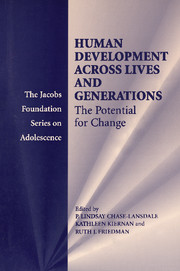Book contents
- Frontmatter
- Contents
- Figures and Tables page
- Contributors
- Foreword
- Acknowledgments
- HUMAN DEVELOPMENT ACROSS LIVES AND GENERATIONS
- Part I Introduction and Overview
- Part II Human Capital
- Part III Partnership Behavior
- Part IV Psychological Health and Development
- 9 Intergenerational Continuities and Discontinuities in Psychological Problems
- 10 Environmental Influences on Intellectual Abilities in Childhood: Findings from a Longitudinal Adoption Study
- 11 Intervention and Policy as Change Agents for Young Children
- Part V Conclusion
- Index
9 - Intergenerational Continuities and Discontinuities in Psychological Problems
from Part IV - Psychological Health and Development
Published online by Cambridge University Press: 12 October 2018
- Frontmatter
- Contents
- Figures and Tables page
- Contributors
- Foreword
- Acknowledgments
- HUMAN DEVELOPMENT ACROSS LIVES AND GENERATIONS
- Part I Introduction and Overview
- Part II Human Capital
- Part III Partnership Behavior
- Part IV Psychological Health and Development
- 9 Intergenerational Continuities and Discontinuities in Psychological Problems
- 10 Environmental Influences on Intellectual Abilities in Childhood: Findings from a Longitudinal Adoption Study
- 11 Intervention and Policy as Change Agents for Young Children
- Part V Conclusion
- Index
Summary
Introduction
Over the course of the last Century, there were recurrent concerns over the extent to which both personal problems and social dependency seemed to recur in the same families over the course of succeeding generations (see Rutter & Madge, 1976). In the UK, the topic came under much increased public scrutiny in 1972 when Sir Keith Joseph, then Secretary of State for Social Services, argued that “ … people who were themselves deprived in one or more ways in childhood become in turn the parents of another generation of deprived children” (Joseph, 1972). The Suggestion was not only that many psychosocial problems tended to persist from generation to generation, but also that the root cause of their transmission lay in some kind of failure in parenting. At first sight, there would seem to be plenty of evidence supporting the general notion. Thus, there have been reports of families in which child abuse has been repeated through several generations (Oliver & Taylor, 1971; Oliver & Cox, 1973). Similarly, systematic follow-up studies of families with multiple problems have shown that many of the offspring reproduce the troubles of their parents (Wright & Lunn, 1971). Numerous studies, too, have shown the frequency with which crime runs in families (see Rutter, Giller, & Hagell, 1998). However, before there can be any assumption that intergenerational continuities in psychosocial problems are the rule, there are numerous conceptual and methodological issues that have to be considered. Equally critical attention needs to be paid to the various alternative mediating mechanisms that could be implicated in intergenerational continuities and discontinuities. The purpose of this paper is to review what is known on these issues and to consider the implications for policy and practice.
Psychological problems are many and various, and there is no attempt in this chapter to consider the total ränge. Rather, the focus is on those that are relatively common in young people (meaning the age period from roughly 10 to 25 years), and that involve substantial physical risks (as in the deaths associated with suicide, violent crime, and some forms of drug abuse) or psychosocial impairment (as reflected in interference with schooling, intimate social relationships, or employment).
- Type
- Chapter
- Information
- Human Development across Lives and GenerationsThe Potential for Change, pp. 239 - 277Publisher: Cambridge University PressPrint publication year: 2004
- 5
- Cited by



